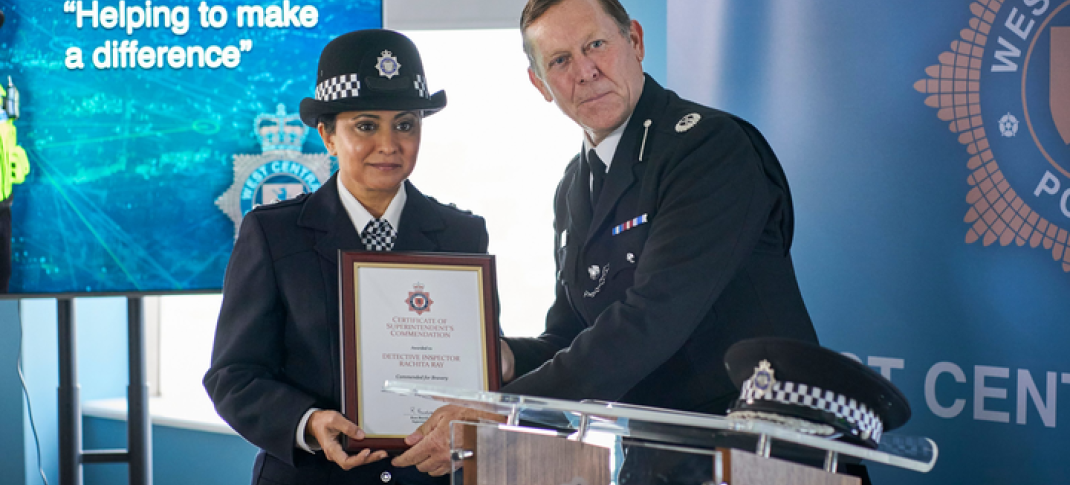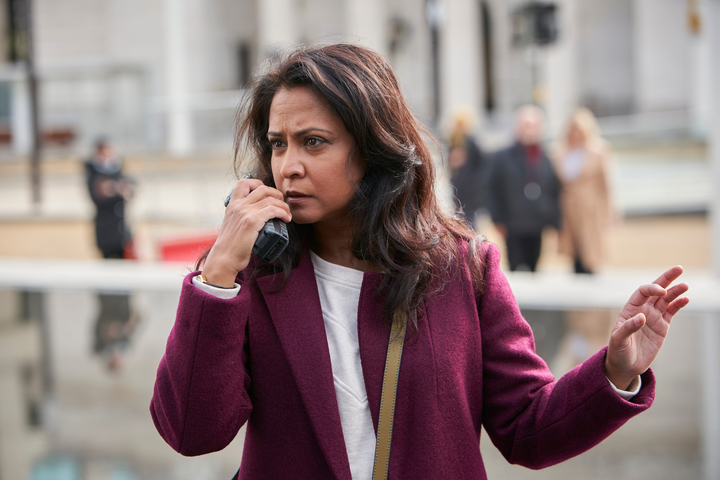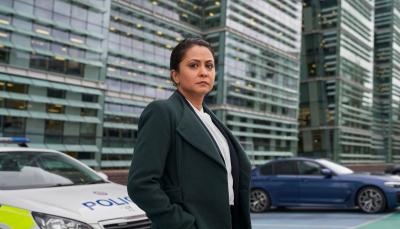'D.I. Ray's Series Premiere Introduces a New Police Procedural Perspective

DI Rachita Ray (Parminder Nagra) receives an award for deftly deescalating a violent situation.
HTM Television/ITV/PBS
The newest member of Jed Mercutio’s Line of Duty police procedural dynasty has arrived. D.I. Ray, created and written by former Line of Duty star Maya Sondhi, is the summer’s latest mystery, though it’s been streaming on PBS Passport since February. The series is a by-the-books procedural except for one major detail: it stars Punjabi-Sikh actor Parminder Nagra and highlights both the internal and external conflicts of working as a woman of color in the police force.
“You never know with these types.”
With this comment about a South Asian suspect, the white Superintendent (Ian Puleston-Davies) of DI Rachita Ray’s police department illustrates the types of thinly veiled racist remarks that Ray hears daily from her colleagues. The series’ first episode takes its time introducing the characters and the mystery at the center of the series, which spans all four episodes. This is no mystery-of-the-week show, Ray has four episodes to sink her teeth into the case at hand.
But before she can get to that, the episode opens not with a thrilling crime investigation but with what is likely a quotidian experience for Ray: a man mistaking her for an employee at a grocery store where she is shopping while off-duty. Thus begins a series of microaggressions — from strangers, colleagues, and superiors — that Ray encounters throughout the episode, and prove that when compounded, microaggressions are anything but micro.
As Ray leaves the store, she happens upon a young man brandishing a knife and tactfully talks him down, urging other responding officers not to escalate the situation. The police force takes notice, and she is awarded for her response to the situation, seemingly for her courage and composure. But at the award ceremony, it is clear that there are other factors at play. The young man with the knife was of South Asian heritage, and other officers imply that though he was just a student experiencing psychosis, officers were concerned that he may have been a terrorist. Unspoken is the fact that the department is happy to leverage DI Ray’s race in its handling of the situation without addressing its own biases.
In addition to the award for her bravery, Ray is awarded a new job, a position in the Homicide department that she had long coveted. It’s easy to see why she is so successful. Ray is good at her job for the same reasons that she is a compelling character: she is empathetic but tough, as thoughtful as she is driven, and cautious without being cynical. But her excitement about her new position doesn’t last long. On her first day, she meets her supervisor, the no-nonsense DI Kerry Henderson (Gemma Whelan).
Henderson introduces Ray to her first case, the murder of a man named Imran Aziz. Henderson explains the case has been classified as a Culturally Specific Homicide. The optimism drains out of Ray as she can no longer deny the reason she’s been brought on board the investigation. As she later tells her boyfriend Martyn (Jamie Bamber), “They all know I’m here to tick a box.”
Ray digs into the case and learns that Imran Aziz had a girlfriend named Anjuli (Lucky Sanghera), whose brothers Navin (Ryan McKen) and Kabir (Manpreet Bachu) had openly feuded with Imran. Not only was Imran, a Muslim man, dating Anjuli, a Hindu woman, but the brothers were also establishing a business in direct competition with Imran’s company.
Ray questions why, given these specifics, the case has been labeled a Culturally Specific Homicide. There’s nothing culturally specific about business competition. But the other officers brush off Ray’s concerns. They must move carefully on this case, Henderson says, because “the community isn’t exactly on our side at the moment due to a few previous incidents.” This line of dialogue is emblematic of the way that the white characters in Ray’s world tiptoe around race and policing, never saying exactly what they mean.
The team finally decides to arrest the two brothers, leading to the most emotionally affecting scene in the episode. Ray watches officers burst into their family home and drag the brothers to Ray at gunpoint so she can officially place them under arrest. The wordless expressions between Ray, the brothers, and their onlooking parents say it all: duty, confusion, betrayal. The brothers are brought in for questioning and refuse to talk. They claim to have been at a gas station around the time of the murder, but there is no sign of them on the station’s CCTV. Despite the evidence pointing toward the brothers, Ray is still stuck on Imran’s girlfriend, Anjuli, feeling like she is still missing major pieces of the puzzle.
Before she can meet with Anjuli’s parents to interview them, Ray is introduced to PS Tony Khatri (Maanuv Thiara), who has been assigned to her as a family liaison. They meet with the parents, who are still shaken from arrests and Ray is still conflicted about her role in it. To make matters worse, she doesn’t speak Punjabi and confuses two Hindu holidays, putting her on the back foot in relating to the family.
That night, someone leaves a mysterious package at Ray’s door. It’s a burner phone, and Ray believes it belonged to Anjuli. Back at the office, Ray argues that all their evidence is circumstantial and there is not enough for a murder charge against the two brothers. Henderson says they need to make a move because the “community” is accusing the police of not prioritizing the case. “The whole point,” she tells Ray, “is that you help us with that, not hinder us.”
After her dust-up with Henderson, Ray laments to Khatri that “everyone wants this to be textbook, but it’s not.” This is the irony of the whole situation that the show highlights so well. Ray has been brought on the case for cultural sensitivity, but she is ignored when she insists that there is something going on beyond cultural stereotypes and assumptions.
Ray refuses to charge the brothers for murder just yet and goes over Henderson’s head to request an extension on the case. That night, her boyfriend proposes to her seemingly out of nowhere, and she halfheartedly agrees. Perhaps the biggest mystery of the series so far is how a woman as competent and confident as Ray ended up with such a lackluster guy and why on Earth she would agree to marry him. The plot thickens when the next day, before going inside to work, she leaves her engagement ring in her car. This secrecy will no doubt come back to bite her.
Alone in the office, she checks over the CCTV footage one more time and realizes a key issue: the camera’s clock was never adjusted for daylight savings time. She obtains the right footage, and sure enough, there are Navin and Kabir Kapoor. With the brothers ruled out, it’s time to move on to the next layer of the investigation: Imran’s business. A visit to his car company reveals that his business had picked up noticeably in the months leading up to his death. Ray and the other detectives suspect a front. It feels like it’s taken them far too long to come to what (to the viewer) is a pretty obvious conclusion, but it goes along with the running theme of the officers on the case overlooking facts that are staring them in the face. For viewers, seeing the case through Ray’s eyes means seeing it with far greater nuance than the other officers.
The dialogue, characters, and the mystery itself are all fresh and unique while still hitting all the hallmarks of the mystery genre that make it a satisfying watch. The Kapoor brothers made for a classic red herring, and even more classic (and far more effective) is the episode’s cliffhanger ending. Ray receives a call from Anjuli, asking her to meet alone. She does, and just as Anjuli begins to reveal that Imran really had been caught up in some shady business dealings, Ray’s phone rings, alarming Anjuli, and she runs away. As Ray pursues her, she is struck down by a blow to the head by an unseen assailant.






